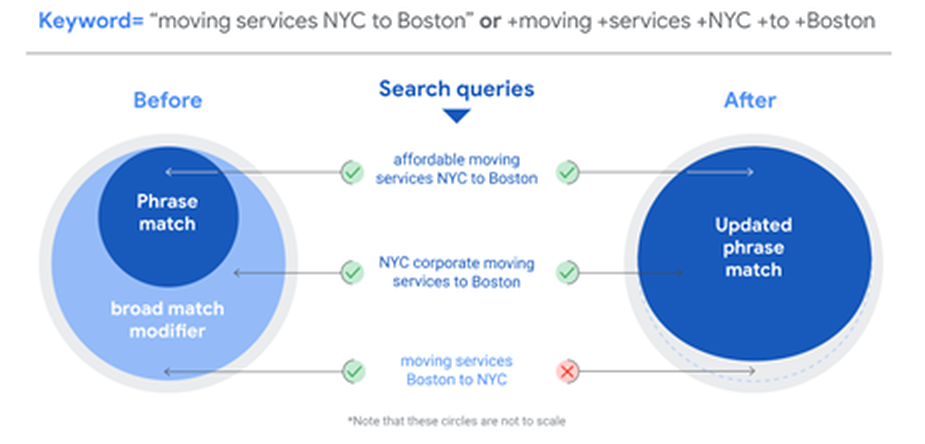
Google Keyword Match Type Adjustment – The End of BMM

Recently Google announced they will be rolling out changes to their keyword match type structure – one of the biggest match type updates advertisers have seen in years. Starting in mid-February, both Phrase Match and Broad Match Modifier (BMM) keywords will begin to transition into new matching behaviour. The goal of this update is to make it easier to reach customers, no matter how they’re searching. But how?
This launch is intended to bring the best features of BMM into Phrase Match and ultimately, phase out support for BMM. Starting in July, advertisers will no longer be able to create new BMM keywords. This means that Phrase Match will expand to cover additional BMM traffic, while continuing to respect word order when it’s important to the meaning. Below are examples to illustrate how matching behaviour will change after this update:
Broad Match Modifier

Phrase match

What does it mean?
According to Google, these changes will better allow advertisers to capture the queries that they want to map to Phrase Match, without mapping into potentially irrelevant searches that would have previously been captured by BMM.
This change will eliminate redundant coverage and make for easier management and keyword build processes. It’s also in Google’s best interest to increase ad clicks, so the additional motivation could be to increase the likelihood that an ad will serve on queries that are not explicitly included in a campaign.
Across match types now, ads may be triggered when a query has the 'same meaning' as a keyword. These are known as close variants and were originally considered plurals or misspellings. However, Google has taken the liberty of looking at “similar intent” based on syntax or implied words. In the below example, the inclusion of “corporate” may change the meaning, but Google is interpreting this as similar intent.

Paid Search impact
This change will likely have a significant impact on paid search accounts by narrowing down the number of available match types. Spend is expected to increase, given the likelihood of ads serving on more queries. CTR is likely to decrease due to misinterpretations of intent. We anticipate this update to have the largest impact on cost-per-click (CPC). Relevance is a crucial component of Quality Score, and as relevance decreases on queries not included within a campaign, CPC should increase. Additionally, ad copy is written with landing page content and targeted keywords in mind, so it may become difficult to ensure relevant messaging and strong Quality Scores, particularly within Phrase Match campaigns.
What should brands do about it?
For now, advertisers should monitor Phrase and BMM campaigns to see how performance shifts. Ultimately, advertisers should opt to pause BMM campaigns and reconsider what keywords are necessary for a given account by conducting a thorough keyword audit. Before July, advertisers should use the time to learn as much as possible about how this update impacts account performance.
In addition, more rigorous monitoring of search query reports (weekly cadence to start) will be necessary to see whether Google is accurately matching user intent. Negative keyword lists will need to grow to account for the wider variety of queries that may be eligible to serve.
Our final take
Google is redefining match types to bring the best of BMM into Phrase Match, with the plan to phase out BMM entirely by July 2021. While questions linger around Google’s ability to accurately interpret search intent, it’s important to be prepared in order to mitigate the impact to paid search accounts and learn as much as possible. Due to potential relevance challenges, we expect increased CPCs resulting in worsened efficiency, and more time spent monitoring SQRs. At the same time, we anticipate increased volume due to greater ad eligibility, which could be a positive when it comes to initial keyword builds and not needing to build them out so extensively. We recommend leveraging responsive search ads and automation to ensure messaging remains as relevant as possible and maintain efficiencies on high-performing keywords. In addition, we recommend keeping BMM keywords live during the initial rollout to fully understand the shifts in performance between Phrase and BMM keywords.













